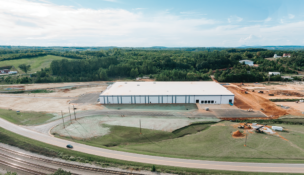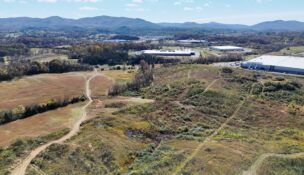Healthy and wealthy
Carilion, manufacturing industries step up operations
Tim Thornton //March 1, 2020//
Healthy and wealthy
Carilion, manufacturing industries step up operations
Tim Thornton //March 1, 2020//
Roanoke County’s main street — Electric Road (state Route 419) — is getting a big boost from the region’s largest employer. Carilion Clinic announced in September it had leased 150,000 square feet at Tanglewood Mall to accommodate Carilion’s growing children’s outpatient practices.
Carilion, the Roanoke nonprofit that operates seven hospitals and more than 200 practice sites from the Shenandoah Valley to Galax, plans to spend about $30 million and 18 months preparing the space.
“We’re going to assimilate all of the children’s outpatient services there,” says Nancy Agee, Carilion’s president and CEO. “We really want it to be technologically advanced and be a cool place for kids to come, really paying attention to what motivates children and moms and dads to have their children there.
“What we’re going to do is step back [and] design this for children, bring all of these services together. Especially for sick children or children with chronic needs, you don’t want them to have to go to multiple places.”
The new center will occupy the space that used to house JCPenney and Miller Motte Technical College. “That whole end [of the mall],” Agee says, “is pretty shuttered.”
Tanglewood began as a popular shopping area, an attraction that drew people to the edge of Roanoke County. But, like many malls across the country, the mall has hit hard times in the era of online shopping, losing anchor stores and searching for ways to attract customers. Jill Loope, Roanoke County’s economic development director, says the Carilion project, an economic boon on its own, will also help draw customers to Tanglewood’s remaining retail businesses.
Agee agrees.
“What we expect, and what the owners of Tanglewood expect, and what the county is excited about as well, is that other businesses then will grow around it,” Agee says, citing Carilion’s Institute for Orthopaedics and Neurosciences in Roanoke city as an example. Where an abandoned grocery store once stood, there’s now a health care center with four restaurants for neighbors and a need for more parking spaces.
“I think at Tanglewood you’re going to see that same kind of synergy,” Agee says.
The Tanglewood project will have 200 to 300 employees and generate 500 to 600 patient trips per day. “That’s a lot of new infusion of activity along the [Route] 419 corridor,” Loope says. “This will be a catalyst for more to come.”
The county plans about $30 million in transportation projects along Electric Road/Route 419. The road will be widened and an improved divergent diamond interchange will replace its existing intersection with U.S. 220, adjacent to the mall. It’s part of the 419 Town Center Plan to revitalize about 390 acres, including Tanglewood Mall, along the road.
All this is going on just a short drive from Carilion Roanoke Memorial Hospital, where Carilion has announced a $300 million expansion. That’s within easy walking distance of the Fralin Biomedical Research Institute, which will open 150,000 square feet of new research space in June, enough to accommodate 25 new research teams.
Carilion Clinic contributed more than $3.2 billion to Virginia’s economy in 2018, according to a Weldon Cooper Center for Public Service study released in January. That doesn’t include the $1 billion Carilion plans to spend on capital projects in its service area over the next seven years.
“Carilion Clinic is incredibly important to this community — way beyond the numbers that are in the economic impact statement,” says Beth Doughty, executive director of the Roanoke Regional Partnership.
The average Carilion wage, excluding physicians, is more than $11,000 higher than average for the Roanoke MSA.
Norfolk Southern Corp. dominated the area’s economy for more than a century, and the railroad’s decision to move its headquarters from Norfolk to Atlanta, combined with its continued reduction of Roanoke-area jobs — the latest round was in February — has been a blow to Roanoke’s identity and the region’s economy. Doughty doesn’t think Carilion will follow the railroad’s path.
“Norfolk Southern, they weren’t making their money here,” she says. “They were making their money throughout the country,” so the company’s regional effect depended on what was going on across the nation. Carilion, Doughty says, makes its money in the region, and Carilion’s money stays in the region.
“Our mission,” Agee says, “is to improve the health of the communities we serve, and that mission includes the economic health because that makes us all stronger and more healthy.”
While Agee heads the Roanoke regions’s largest employer, she also says she knows economic diversity is crucial to building and maintaining a strong and healthy economy.
Tea, tech and trucks
Traditional Medicinals, a California-based wellness tea company that plans to invest $29.7 million to establish its East Coast operation in Franklin County, is an example of that diversity.
The company, which announced in January it would set up shop in Summit View Business Park, has been in business since 1974 and sells its 50 teas at Kroger grocery stores and 70,000 other retail stores worldwide.
According to Doughty, Traditional Medicinals’ 56 jobs will have wages about $10,000 higher than Franklin County’s average salary of nearly $34,000.
“We’re seeing our community and our economic development efforts move more strongly, definitively toward those higher paying jobs,” Doughty says. “This is not necessarily influenced by the work that Roanoke Regional Partnership or regional governments do, but I think that in general this sets a standard for how we want our community to move forward in terms of prosperity.”
More traditional industries have also announced plans to add to the region’s prosperity. Software developer Ozmo plans to create 40 new jobs in Blacksburg. The four-year-old startup, which spun out of local digital consulting company Modea, made the announcement last May.
“Our Blacksburg location provides Ozmo with unique access to incredible talent from Virginia Tech and surrounding universities across technology, engineering and business fields,” Ozmo CEO David Catalano says. “Blacksburg is one of the best places in the country to raise a family, which helps us not only hire stellar employees but also retain them and keep them in the area. Ozmonauts can take advantage of the amazing outdoor activities the area offers, including hiking, biking and tubing down the river, while also being a part of a burgeoning technology community.”
The truck manufacturing sector also made several big moves in the region. The Volvo Group announced plans last June to invest $400 million and add 777 jobs in its Dublin plant in Pulaski County, before saying last November that it would lay off 700 workers beginning in January. (Read story here.)
In late January, Mack Trucks Inc., part of the Volvo Group, announced it would turn a former Roanoke County book printing plant into a truck plant later this year, investing $13 million and bringing 250 jobs.
In Roanoke County’s Center for Research and Technology, American Electric Power (AEP) bought 53 acres, where it plans to build a 75,000-square-foot transmission operations center, a $60 million investment that will create about 50 jobs.
Harris Corp. created about 100 new jobs in its night vision division before selling the division to Israel-based Elbit Systems Ltd. last April for $350 million in cash. The company got a $249 million contract last September to supply night vision goggles to the U.S. Marines.
The Patton Logistics Group, which employs 560 people nationwide, plans to invest $12 million to establish a logistics and warehousing operation in the New River Valley Commerce Park in Pulaski County, creating 33 jobs, it announced in January.
Richfield Living, a nonprofit retirement community in Salem, began construction of a $93 million expansion that includes 140 new living spaces and a town center with a wellness and education center and a new chapel.
Pratt Industries, a recycled paper and packaging company, opened a packaging and shipping materials manufacturing operation in a Botetourt County shell building last summer, with plans to invest more than $20 million. The facility, the company’s second in Virginia, employs about 50 people.
Many of the companies coming to the region will receive state funding and support in training new employees.
“There’s been a lot,” Loope says of the region’s recent economic activity, “and there’s more to come.”
-

















